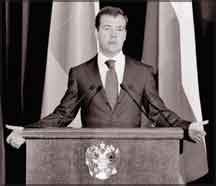Russia may aim nukes at Europe
By Mark Franchetti
RUSSIA is considering aiming nuclear weapons at western Europe for
the first time since the end of the Cold War, according to senior
defence sources in Moscow.
The move is in response to US plans to put anti-missile bases in
eastern Europe for a defence shield against missiles from Iran and other
countries.
|

Medvedev |
The plans under discussion include the deployment of ballistic
missiles to Kaliningrad, a Russian enclave between Lithuania and Poland.
Kaliningrad has been nuclear-free since the US and Russia agreed to
scale back their nuclear arsenals at the end of the Cold War.
A Russian parliamentary committee visited 10 days ago to examine how
a new generation of nuclear missiles could be based there. Any such
deployment would significantly escalate the tensions between Moscow and
Washington.
US Secretary of State Condoleezza Rice signed an agreement in Prague
this month to build a radar station in the Czech Republic. The station
is an important part of the US anti-missile shield, which Washington
says will defend Europe and the US against attacks from rogue states
such as Iran and North Korea.
Another deal, for Poland to host a base for 10 anti-missile
interceptor rockets on its border with Russia, is expected to be
concluded this year. Moscow is opposed to the shield, saying it is part
of an aggressive US military expansion up to its border.
"One of the main steps under consideration is a redeployment of
nuclear missiles to Kaliningrad and Belarus," said a source with close
connections to the Russian Defence Ministry. "These missiles would be
pointed at Europe.
It would be a perfectly legitimate step. If America wants to expand
its military capabilities in Europe, then we have the right to act
accordingly."
The source disputed the US claim that the shield was intended to
intercept missiles only from rogue states. "How would Washington feel if
we placed interceptor missiles on Cuba or Venezuela?" he said.
Experts said the threat of deploying missiles in Kaliningrad was
aimed at fuelling opposition to the US plan in Poland and the Czech
Republic, where oil supplies to its refineries from Russia fell sharply
this month.
"We take the possibility of missiles being redeployed against Europe
very seriously and are aware of the discussions about Kaliningrad," a
Western diplomat said.
"But we also think there is some bluff involved.
The Kremlin is banking on one thing: that the shield won't see the
light of day before President George W. Bush leaves the White House next
year, and it could be scrapped after that."
Russia's angry response dispelled any illusion that under Dmitry
Medvedev the Kremlin would be any less hardline than it was during
Vladimir Putin's presidency.
-Russia Times |
